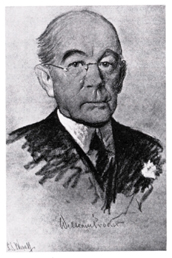The William Procter Prize for Scientific Achievement
Since 1950, the William Procter Prize for Scientific Achievement has been awarded annually to a scientist who has made an outstanding contribution to scientific research and has demonstrated an ability to communicate the significance of this research to scientists in other disciplines.
Prize for Scientific Achievement has been awarded annually to a scientist who has made an outstanding contribution to scientific research and has demonstrated an ability to communicate the significance of this research to scientists in other disciplines.
The prize consists of a bronze statue, commemorative certificate, and an award of $10,000. The Procter Prize recipient receives a $5,000 honorarium and designates a younger colleague, usually in the same field of research, to receive a $5,000 Grant in Aid of Research. Presentation of the Procter Prize is traditionally a principal event at Sigma Xi's annual meeting or other suitable venue.
Nominations
The deadline for submission of nomination materials is January 31.
Nominations for the William Procter Prize should include:
- A current curriculum vita that follows the Sigma Xi Criteria for Curricula Vitae
- A letter of nomination that addresses the following:
- A brief (~25 word) introductory statement of the nominee's accomplishments that led to the nomination
- The impact of the nominee's work on the current state of physical, biological, mathematical, engineering or social and behavioral sciences - how it has resulted in new approaches, new ways of thinking, or led to especially promising areas of inquiry.
- Ways in which the scientific community has recognized these accomplishments.
- Influence on education through publications, teaching activities, outreach, mentoring, etc.
- Ability of the nominee to give an address at the Sigma Xi Annual Meeting that is dynamic, engaging, and readily understood by scientists across the disciplines.
- One or two additional letters of support of no more than one page each.
Submissions, including letters of recommendation, should be submitted by e-mail.
William Procter

William Procter (1872-1951), was the grandson and heir of one of the founders of the Procter and Gamble Company. After graduating from Phillips Exeter, Procter majored in chemistry at Yale, obtaining a Ph.D. in 1894 from the Sheffield Scientific School. He organized the investment firm of Procter and Borden in 1902, retiring from it in 1920, though he continued to serve on the board of directors of Procter and Gamble.
During his boyhood summers at Newton, Connecticut, he became interested in insects. At age forty-five he enrolled in the department of zoology at Columbia University where he was elected to Sigma Xi in 1939).
In 1928, he built a field laboratory on Mt. Desert Island, Maine and began publishing a series of surveys that gained him a reputation as a distinguished natural scientist.
In addition to his active support of Sigma Xi and its affiliated organization, the Research Society of America (RESA), Procter was connected with the Academy of Natural Sciences of Philadelphia, Plymouth Marine Laboratory (England), the American Museum of Natural History, the New York Entomological Society, the Royal Academy of Science of Canada and the London Ray Society.
Procter endowed the award that bears his name in 1950, the year before he died. Karl T. Compton, then Massachusetts Institute of Technology president and RESA chairman, was its first recipient. RESA merged with Sigma Xi in 1974.
William Procter Prize Recipients